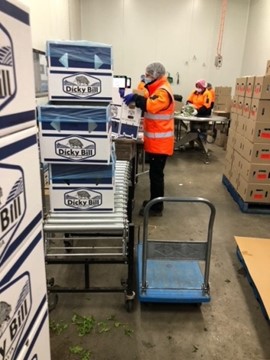Ryan McLeod & Hugh Reardon (Dicky Bill Australia)

How did you get into the horticultural industry?
From the humble beginnings of a small 40 acre market garden in Stanthorpe in the mid 1990’s, Dicky Bill Australia has enjoyed consistent stewardship from the current two families that own and operate the salad production company now for in excess of 20 years.
Originally founded by Richard (Dicky Bill) and Kaye Barnard in 1996, their son Ryan McLeod joined the business to pick up the mantle after Dicky Bill passed away in 2001. From there, childhood friend Hugh Reardon joined the business in 2004 allowing Kaye to retire and join the annual pilgrimage north with the Grey Nomad migration.
Ryan’s wife Tahirih joined the business in a full-time role in 2009 reducing back to part time with the arrival of the next generation of farmers with their two children. Hugh and his wife Kristen and three children live on the farm in Maffra.
How long have you had your current property?
In 2010 the business relocated all of its winter production to the Drinan Farm just outside of Gin Gin, Queensland.
In 2012 the business relocated its summer growing production area to Maffra, Victoria. 2014 saw the expansion of the Winter production area at Drinan and the development of the Maffra Processing Facility. In 2015 the Summer production area was expanded with the acquisition of a small adjacent market garden. This also saw the establishment of Dicky Bill Australia as its own business entity leasing a warehouse facility in Brisbane.
What crops do you grow?
Dicky Bill specialise in leafy salad vegetables. For over 25 years, Dicky Bill have keenly concentrated on growing a clean, crisp, baby leaf salad line that maintains its freshness for as long as possible.
Do you have any plans to expand or to diversify?
Dicky Bill Australia is focused on advancement and innovation in farming practices, always striving to further improve product quality, efficiency and sustainability.
Vertically Integrated: As we are the grower, harvester and packer, we can control all of the labour involved. As a result we can proudly say that we ethically source and supply all of our own employees across the growing and packing chain. As the farmer, we grow 100% of our produce and don’t buy through third parties, we only harvest what we need to despatch to enjoy the ultimate in freshness. Straight out of the paddock, into a bag, and onto your plate creating the masterpiece for dinner.
What are the biggest challenges you face at the moment?
Recruitment and staffing. Being seasonal employment in both locations it is often difficult to source and retain skilled team members with a keen desire to learn and work hard. 2020 has provided further issues with this – due to the limited availability of itinerant workers, and the inception of an increased job seeker payment– meaning more local potential candidates not actively looking for work opportunities as the financial gain of working compared to the job seeker is minimised.
Are any of your children likely to take up work in the horticultural industry?
Both the McLeod’s and the Reardon’s have young families, ranging from 9 years down to 2, therefore it is too early to know if they are likely to follow in our footsteps. Our parenting goals are to provide our children with the life skills and opportunities to achieve whatever they choose, with no expectation that this be in a particular industry.
Any advice for working holiday makers or other workers?
There are plenty of employment opportunities available in the horticulture industry – food production is a necessity. Find employers – like Dicky Bill Australia – who employ all their staff directly, not through the use of contractors and ensure that you are being paid as per the award with all your superannuation entitlements included.
Sometimes in our industry, you need to start with more menial roles, and make sure you demonstrate and communicate your desire to be considered for different roles within the business.
Work your way up and learn everything you can – as this will better position you to transition into different roles within the business.
Any advice for other growers when it comes to workers?
Look after your team members! Make sure you let them know the integral role they play in the bigger picture. Often different sections of the business don’t get to see or understand how their role forms part of the cogs that turn the business wheel. By communicating and sharing this with your staff you are positioning the business to have higher retention and employee satisfaction – as they will feel valued and appreciated.
